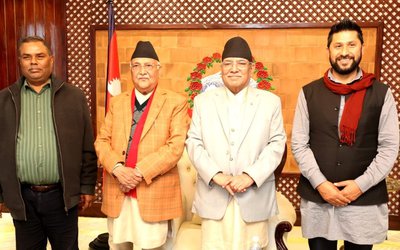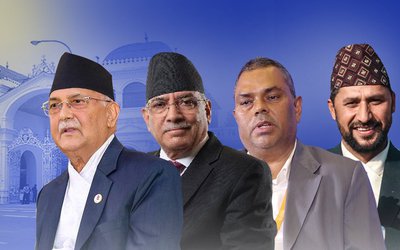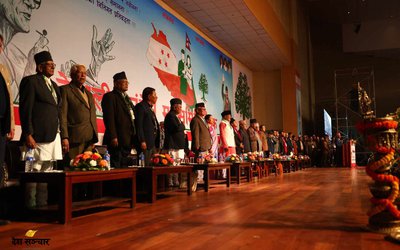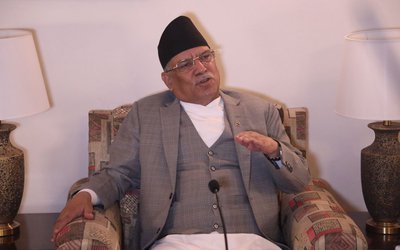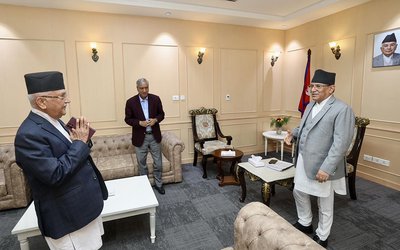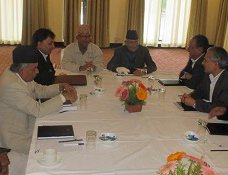
Almost eight years have already passed since the overthrow of the monarchy, which the political parties blamed was a major factor of political instability and threat against the people’s sovereignty. However, nothing has changed as political instability continues and people’s sovereignty is nowhere near the top. What have changed are the facades of instability.
Although the Constituent Assembly is elected by the people, it failed to exercise its own sovereign power. Out of 601 members in the Assembly, five leaders of three political parties are projected as main players of the game. However, they too look helpless in making decisions as what they say does not last for more than a couple of hours.
One time die-hard enemies, UCPN-Maoist and Madheshi front, are now die-hard allies. Similarly, Madheshi front, which has been demanding one Madhesh in south, is the closet ally of Janjatis, whose demands contradict with those of Madhesh.
Janjatis new front led by Padma Ratna Tuladhar declared an unending struggle for the cause of ethnic and identity based federalism and a faction of Nepali Congress led by Khum Bahadur Khadka called for a rebellion to restore Nepal as a Hindu state.
As Nepal is in the process of Constitution writing through Constituent Assembly, the recent political trends indicate that no one has faith on the legitimate and stable process. What all of them prefer is to rock the process.
"Nepali Congress and CPN-UML are trying to reverse the achievements made by the People’s War, Madhesh Andolan and Jan Andolan II. We will not allow Nepali Congress and CPN-UML to table the draft of the new constitution at the Constituent Assembly," thundered UCPN-Maoist leader Pushpa Kamal Dahal Prachanda. “Let’s see how Nepali Congress and CPN-UML table the draft in the CA."
Another voice of dissension is coming from the Madheshi leader. "The day when Nepali Congress and CPN-UML will table the draft of the constitution in CA without consensus, we will start massive political protests outside the Constituent Assembly to stop it," threatened Upendra Yadav, leader of MJF.
Janjatis see the end of CA."As the possibility for making the new constitution based on an identity-based federalism and secularism has come to an end, the only way out left for now is to go for an indefinite struggle," said Padma Ratna Tuladhar, of the newly formed alliance of Ethnic groups.
As opposition political parties are expressing the anger over the ongoing process, Nepali Congress and CPN-UML are expressing that they will promulgate the new constitution by January 22, 2015.
Even if the four major political parties develop consensus, Rastriya Prajatantra Party Nepal has already made it clear that it will not allow any constitution to pass without sending the issue of Hindu state into referendum.
If all political parties within the CA come out with a consensus document, another force, that is, CPN-Maoist led alliance, which boycotted the last CA elections, is waiting for the opportune time to strike against the constitution writing process.
Whether there is constitution or no constitution, Nepal’s overall political scenario has not changed much. Nepal continues through the various phases of prolonged political instability in its history of over 60 years with five constitutions and three political systems.
Whether it be Nepali Congress, CPN-UML, UCPN-Maoist, Madheshi, RPP-Nepal or the other ethnic front, they all remain constant sources to carry the course of political instability.
Every political alliance is possible in Nepal provided it plays as a factor for instability. Given Nepal’s geo-political position with two great powers, one may have to look at the many more facets of political instability.
In the words of John W. Whelpton, as mentioned in the foreword to American scholar late Leo Rose’s book Strategy for Survival, "India and, to a much lesser extent China, will continue to influence internal politics and skilful handling of relations with both neighbors will remain the key requirement for any Nepalese government that wishes either simply to survive itself or to tackle the many internal problems that Nepal now faces.”
- TANAHU HYDROPOWER PROEJCT: A Significant Achievement
- Apr 15, 2024
- AMBASSADOR HANAN GODAR: Sharing Pain With A Nepali Family
- Mar 30, 2024
- VISIT OF KfW AND EIB TO NEPAL : Mission Matters
- Mar 25, 2024
- NEPAL BRITAIN SOCIETY: Pratima Pande's Leadership
- Mar 24, 2024
- NEPAL ARMY DAY: Time To Recall Glory
- Mar 15, 2024


